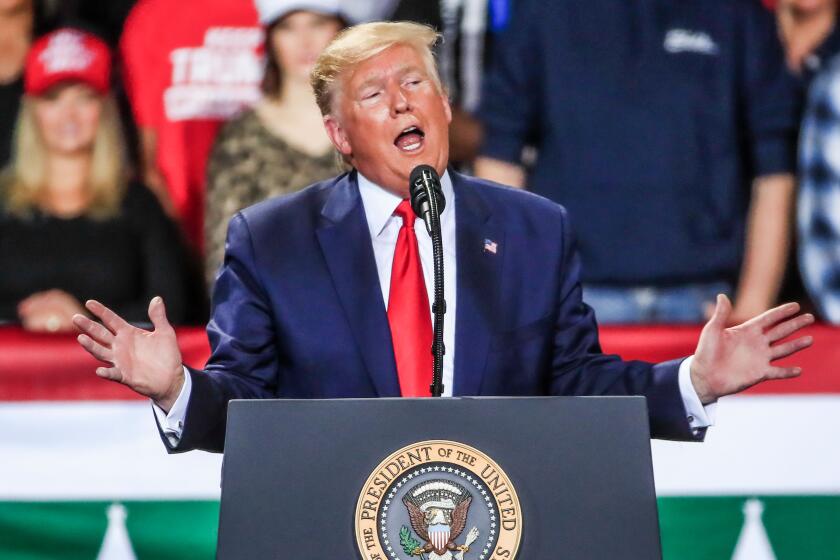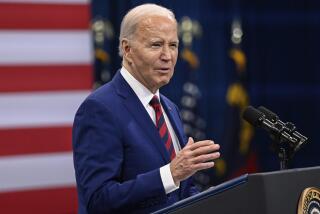6 takeaways from Tuesday’s Democratic primary contests as Biden pulls further ahead of Sanders

- Share via
In a presidential race defined by its unpredictability, Tuesday’s election results have, for now, traded surprise for status quo — and that is good news for Joe Biden.
With 352 delegates at stake across six states — Michigan, Missouri, Mississippi, Idaho, North Dakota and Washington — this sequel to Super Tuesday was all about who has the edge in what effectively has become a two-man race.
Biden added to his win column early in the night, with victories in Mississippi and Missouri, according to Associated Press projections, followed by a victory in Michigan, the top delegate prize of the night. The Michigan results dealt a blow to Sanders, who was hoping for a repeat of his upset win there over Hillary Clinton in 2016.
Here are the big takeaways so far from the most recent round of balloting:
Biden’s glide path to the nomination
Remember when the question was whether Biden’s campaign would make it to South Carolina at all? That was just over two weeks ago — or several lifetimes, when it comes to news cycles. Now, the former vice president is closing out Tuesday night as the near-certain Democratic nominee.
Wild things can happen, of course, as this primary race has already shown. But Biden has accumulated a lead of more than 150 delegates in the chase to clinch the nomination. Sanders would need to win more than 55% of delegates in the remaining contests to take back the lead. And there is rougher territory ahead for the Vermont senator, particularly in upcoming states such as Florida and Ohio, where Biden is favored.
In his election night speech in Philadelphia, Biden struck a tone that was more solemn than boastful, taking care to praise Sanders and invite his followers into the fold. It was a show of magnanimity that comes from confidence in the way this race is shaking out.
Sanders, meanwhile, did not make public remarks Tuesday night after returning home to Burlington, Vt.
And before you ask: Yes, Hawaii Rep. Tulsi Gabbard is still in the mix. But aside from scooping up a pair of delegates in American Samoa, she has failed to establish herself as a serious contender to capture the nomination.
Biden’s Southern comfort
Biden owes his candidacy to African American voters in the South, banking impressive margins among that group first in South Carolina, and then in Virginia, North Carolina, Alabama and Tennessee. On Tuesday, his dominance continued in Mississippi, where nearly two-thirds of Democratic primary voters were black, according to exit polls; more than 80% of those African American voters supported Biden.
Biden was considered such a lock to win the Magnolia State that the Sanders campaign canceled a planned speech there last week, opting instead to spend more time in Michigan. There, Sanders touted the endorsement of the Rev. Jesse Jackson, the civil rights leader and former presidential candidate, in hopes of making inroads with African American voters.
Democrats in crucial Michigan aren’t waiting for a nominee to mobilize to beat President Trump. But could his appeal to white working-class voters again defeat them?
For Sanders, the same ‘old’ problem
Even before voting ended in Missouri, early exit polls from the state signaled a big problem for Sanders: About three-quarters of the voters were 45 or older. Although Sanders has emerged as the runaway favorite among young voters, he has struggled mightily to win over the Democratic Party’s older, and most reliable, constituents.
Sanders has tried to improve his standing with older voters, particularly by positioning himself as the champion of Social Security. But last week, Biden won the backing of two-thirds of voters 45 to 64 and got nearly 80% of those 65 and older. Together, the two groups accounted for 66% of the voters on Super Tuesday.
Sure enough, when the polls in Missouri closed at 8 p.m. Eastern time, Biden was swiftly called the winner of the Show-Me State.
Whiplash from the white working class
When Sanders mounted a serious challenge to Hillary Clinton for the Democratic nomination four years ago, he was boosted by support from white working-class voters. That demographic, which sided decisively with President Trump in 2016, has been central to Sanders’ pitch this time that he is best positioned to win the White House.
But Tuesday’s results signaled that Sanders may not have such a firm grip on those voters. In Missouri, he narrowly won white voters without a college degree in 2016, but this time, Biden squeaked out an advantage with that group, according to preliminary exit polls.
The same goes for Michigan, where Sanders notched a strong performance in 2016 among working-class whites, bolstered by his denunciation of free trade deals that hammered the state’s industrial economy. But on Tuesday, exit polls found Biden beating Sanders among white voters without a college degree by 5 points. The surveys also found Biden with a 12-point lead among voters in union households.
Feeling the Bern no more
Compounding the sting of Sanders’ bad night was that he had a decidedly lackluster showing in states that had once enthusiastically embraced him.
Michigan was the highest-profile reversal for Sanders, but the later contests of the evening took place in states where Sanders had racked up enormous wins over Clinton in 2016. He won North Dakota by nearly 40 percentage points four years ago, Idaho by almost 60 and Washington by 45.
For most of Tuesday night, those races remained too close to call, a sign that Sanders’ once-commanding advantage had evaporated. Idaho officially moved out of his column when the Associated Press called the state for Biden late Tuesday night. Sanders ultimately notched a win in North Dakota when it was called Wednesday morning, providing the slimmest of silver linings, but the margin was notably narrower than four years ago.
Campaign, meet coronavirus
It’s fair to say Tuesday’s contests have been a bit overshadowed by the growing alarm over the spread of the novel coronavirus in the United States and across the globe.
The specter of the virus has hovered around the campaign for days, but it directly affected the stump on Tuesday, after Sanders and Biden both canceled evening rallies in Cleveland, citing guidance from public health officials there.
Meanwhile, in Washington state, which has been among the hardest-hit by coronavirus, the all mail-in ballot election averted the need for large gatherings at polling places. Officials there suggested another level of caution, urging voters to use damp sponges or cloths to seal the ballot return envelopes. The Washington secretary of state tweeted a catchy slogan: “Whether healthy or sick, please don’t lick!”
More to Read
Get the L.A. Times Politics newsletter
Deeply reported insights into legislation, politics and policy from Sacramento, Washington and beyond. In your inbox twice per week.
You may occasionally receive promotional content from the Los Angeles Times.












